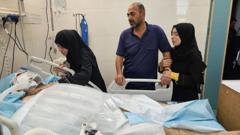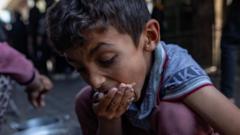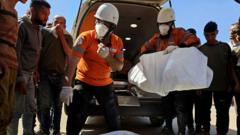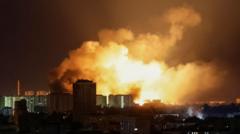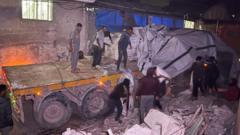In a harrowing account, a local journalist from the BBC reveals the plight of young children in Gaza, focusing on the severe malnourishment of a five-month-old girl, Siwar Ashour, as families struggle against the backdrop of war and blockade.
"Desperate Situation for Gaza's Children Amid Israeli Blockade"
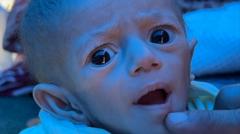
"Desperate Situation for Gaza's Children Amid Israeli Blockade"
Gaza's children face extreme malnutrition and scarcity of essential supplies as the conflict escalates.
As the camera pans across the ruins of Gaza, it captures a harrowing silence; children endure lives shrouded in loss and despair, reduced to a state of hunger, waiting for aid that never arrives. The reality of life in Gaza has driven home an indelible truth, as the local journalists bear witness to the devastating toll of conflict on innocence—children now accustomed to death and destruction.
Today, a local cameraman, who remains unnamed due to safety concerns, embarks on a search for Siwar Ashour, a five-month-old baby suffering due to severe malnutrition exacerbated by the ongoing Israeli blockade. Earlier this month, Siwar weighed a mere 2.1 kg (approximately 4.6 lbs) when the cameraman encountered her at Nasser Hospital in Khan Younis. Alarmed by her fragile condition, he wrote about the emotional devastation he felt witnessing her plight, compelled to return and learn of her current status.
Upon arriving in the disaster-stricken neighborhoods, he encounters an overcrowded makeshift shelter where Siwar resides with her mother, Najwa, and grandmother, Reem. They share a limited space equipped with a few mattresses and a scant supply of essentials. Najwa, age 23, notes the inadequacy of supplies for Siwar, who can't tolerate regular milk due to an allergic reaction. While the hospital provided one can of specialized baby formula upon discharge, its dwindling supply adds to their survival urgency.
"The situation is dire," Najwa states, expressing concern over the constant presence of flies around her baby, and the horrors that have surrounded Siwar since birth, marred by the persistent sounds of war—explosions, gunfire, and distant drones. Her fear intensifies knowing that, like many mothers in Gaza, she faces malnourishment herself, diminishing her ability to care for Siwar.
While Israeli officials claim no shortage of food exists in Gaza, international voices—including the UN and aid organizations—report a starkly different reality, highlighting a critical humanitarian crisis. Prime Minister Benjamin Netanyahu's commentary on the situation clashes with mounting evidence of starvation and desperate living conditions. The UN reports that 80% of Gaza is designated as militarized zones, and the restrictions placed on essential supplies have significantly worsened the population's plight.
The trauma experienced by families like Najwa's underscores the harrowing effects of the protracted conflict. "We can't think about the future or the past," Najwa reflects, "we are only trying to survive the moment." The ongoing agony felt by the 2.1 million residents of Gaza, particularly innocent children like Siwar, remains a somber reminder of the conflict's human cost.


